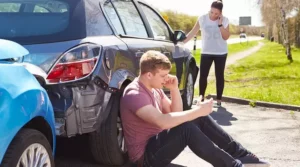Is it illegal to text and drive in Louisiana? Distracted driving can lead to car accidents. So we ask is it legal to text while driving in Louisiana? Let’s take a look at the full text of La. R.S. 32:300.5 which deals with texting and driving in Louisiana: §300.5. Use of certain wireless telecommunications devices for text messaging and social networking prohibited A.(1) Except as provided in Subsection B of this Section, no person shall operate any motor vehicle upon any public road or highway of this state while using a wireless telecommunications device to write, send, or read a text-based communication. For purposes of this Section, a person shall not be deemed to be writing, reading, or sending a text message if the person reads, selects, or enters a telephone number or name in a wireless telecommunications device for the purpose of making a telephone call. (2) No person shall operate any motor vehicle upon any public road or highway of this state while using a wireless telecommunications device to access, read, or post to a social networking site. (3)(a) “Wireless telecommunications device” means a cellular telephone, a text-messaging device, a personal digital assistant, a stand alone computer, or any other substantially similar wireless device that is readily removable from the vehicle and is used to write, send, or read text or data through manual input. A “wireless telecommunications device” shall not include any device or component that is permanently affixed to a motor vehicle. It does not include citizens band radios, citizens band radio hybrids, commercial two-way radio communication devices, two-way radio transmitters or receivers used by licensees of the Federal Communication Commission in the Amateur Radio Service, or electronic communication devices with a push-to-talk function. (b) “Write, send, or read a text-based communication” means using a wireless telecommunications device to manually communicate with any person by using a text-based communication referred to as a text message, instant message, or electronic mail. (c) “Access, read, or post to a social networking site” means using a wireless telecommunications device to access, read, or post on such device to any web-based service that allows individuals to construct a profile within a bounded system, articulate a list of other users with whom they share a connection, and communicate with other members of the site. B. The provisions of Paragraph (A)(1) of this Section shall not apply to the following: (1) Any law enforcement officer, firefighter, or operator of an authorized emergency vehicle while engaged in the actual performance of his official duties. (2) An operator of a moving motor vehicle using a wireless telecommunications device to: (a) Report illegal activity. (b) Summon medical or other emergency help. (c) Prevent injury to a person or property. (d) Relay information between a transit or for-hire operator and that operator’s dispatcher, in which the device is permanently affixed to the vehicle. (e) Navigate using a global positioning system. (3) A physician or other health care provider using a wireless telecommunications device to communicate with a hospital, health clinic or the office of the physician, or to otherwise provide for the health care of an individual or medical emergency through a text-based communication. C.(1) The first violation of the provisions of this Section shall be punishable by a fine of not more than five hundred dollars. (2) Each subsequent violation shall be punishable by a fine of not more than one thousand dollars. (3) If the person is involved in a crash at the time of violation, then the fine shall be equal to double the amount of the standard fine imposed in this Subsection and the law enforcement officer investigating the crash shall indicate on the written accident form that the person was using a wireless telecommunications device at the time of the crash. (4) Any violation of this Section shall constitute a moving violation. Acts 2008, No. 665, §1, eff. July 1, 2008; Acts 2010, No. 203, §1; Acts 2013, No. 62, §1; Acts 2016, No. 472, §2, eff. June 13, 2016. Here are ten good reasons not to text and drive: If you have been injured because someone was texting while driving, contact a car accident lawyer today. So, in summary, we should all be more careful to not text while driving.


